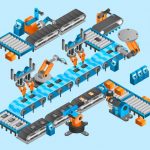What Food Firms Need to Know About ERP Software
What is an ERP System, and Why is it Important in the Manufacturing of Food?
Enterprise Resource Planning, or ERP, is a term used to describe a company management software system. A food company’s business activities, including buying, accounting, finance, human resources, manufacturing, and logistics, may be managed and optimized with the use of an ERP system. In other words, ERP is the program that keeps your company operating, processing orders, monitoring and improving recipes, billing, scheduling manufacturing, and more.
Good ERP systems, like this one: https://www.inecta.com/food-erp, are capable of giving all departments and participants in a food company consistent data and do not require any third-party software. What makes sense in principle guarantees quick and effective procedures: when a client order is received via an EDI or online store, the system instantly confirms stock availability, alerts the production scheduler, and starts the items selecting process without any interruptions or distractions.
It is extremely helpful for manufacturing organizations if its ERP also includes the production processes. These systems can reveal areas that can be optimized by automatically collecting and processing operational data, enhancing machine performance, or calculating overall equipment effectiveness.
The ERP system serves as a key building element in the food industry since it combines commerce, product management, and production technological intelligence.
Must-Have Features in a Food ERP System
There is no sector quite like the food industry, and ERP has to accurately reflect all of its unique features. The demands on businesses are great, and there are many variations within the sector. For example, meat producers need a function for cutting calculations, the dairy industry benefits from integrated milk payment statements, and huge bakeries place a premium on silo management.
Despite these variations, there are a few necessities for any business.
- The ERP system must be able to provide accurate cost data for all parts, including completed goods, joint products, and byproducts. This is necessary for pricing as well as for the estimation of material and manufacturing costs.
- Verify that the system can display and optimize recipes, bills of materials, and product calculations without any issues.
- Decision-makers can only make the most of their business if vital data and important performance indicators can be quickly accessible from the ERP system. Examples include evaluations, gross margins, and monitoring of processes and goods.
- Variable weight handling must be automated in the program. If not, marking the weight price will be problematic, particularly for items that are not equalized.
- Planning for manufacturing must take into account the need of producing fresh commodities. Additionally, forecasting and the determination of the ideal batch sizes require data from each value-adding stage. This lessens the negative effects of the fact that the most significant touchpoint, retail sales data, typically remains a “black box.”
- The Covid-19 pandemic has made mobility increasingly more essential to success. The other workers should still have access to the primary data in the ERP system even though just a small number of them are expected to work on-site. Workflows for documents, assessments, and work procedures must all be ongoing at all times, including through remote access.
- Traceability is another crucial factor. Market watchers anticipate that customers will place a higher value on transparency as they seek to understand the complete context of their food. Speaking about retail outlets for food, ERP needs to show this data and product flows for customers who are browsing the shelves.
All parties involved benefit from the ERP software’s functionalities in the end: executive managers and supervisors may make better judgments thanks to central data processing and easy access to analyses and reports. The continuous data flow on the shop floor improves both the process and product quality. And the clients are pleased with the providers’ supply networks’ dependability and delivery accuracy.
What Factors Should Food Firms Take into Account While Choosing their ERP System?
One of the major problems confronting decision-makers in the food business is selecting the best ERP solution. Compared to other capital products, the risk of choosing the incorrect horse to support is significantly larger. If necessary, you could always swap out a single computer for another, but ERP software interferes with all departments, making switching to a different system challenging. Furthermore, it is challenging to compare the suppliers’ offers. But how can you accomplish your objectives safely?
The software’s industry focus is the key deciding element in the choice. An ERP system that effectively and to standard covers the business processes of the food sector is always advantageous. Faster release upgrades, everyday operations, and last but not least, implementation are all examples of this. Additionally, your ERP partner should be knowledgeable about and experienced in the food sector. The essential idea is that everything is feasible with trained personnel on site. The top consultants are comfortable in both the food sector and the information technology world. Then everyone can communicate in the same language.










